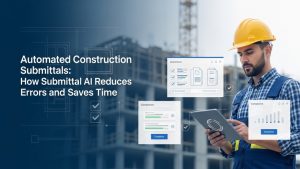Reading Time: 10 minutes
In the ever-evolving and intricate world of construction, effective communication is the cornerstone of success. Requests for Information (RFIs) serve as a critical communication channel, enabling stakeholders to clarify ambiguities, resolve design conflicts, and ensure everyone is working with the same understanding.
However, managing these RFIs, especially in large-scale projects with numerous participants, can quickly spiral into a chaotic whirlwind of emails, spreadsheets, and phone calls. This can lead to miscommunication, delays, cost overruns, and ultimately, project failure. This is where RFI Construction Management Software emerges as a savior, offering a centralized and digitized solution to streamline the entire RFI process, fostering collaboration, transparency, and efficiency.
Work Smarter, Not Harder
iFieldSmart empowers your team with AI-driven efficiency to simplify scheduling, boost collaboration, and keep projects on track.
Schedule a MeetingChallenges in Traditional RFI Management
Traditional RFI management, characterized by manual processes and disjointed communication channels, presents a multitude of challenges that can significantly impede project progress and efficiency:
- Information Overload and Scattered Communication: RFIs often get buried in overflowing email inboxes, lost in file folders, or scattered across various communication platforms, making it difficult to track and manage them effectively. This can lead to critical information being overlooked, resulting in delays and costly errors.
- Version Control Nightmares: Multiple versions of drawings, specifications, and contracts circulating among stakeholders can create confusion and lead to costly rework due to outdated information. Keeping track of the latest revisions and ensuring everyone is working with the correct version becomes a herculean task.
- Lack of Transparency and Accountability: In the absence of a centralized system, tracking RFI responses, identifying bottlenecks, and determining responsibility for delays becomes a complex and time-consuming process. This lack of transparency can lead to finger-pointing and disputes, hindering project progress.
- Tedious Manual Processes and Inefficient Workflows: Manually logging RFIs, generating reports, and following up on responses consume valuable time and resources that could be better utilized for core project activities. This manual approach is prone to errors and inconsistencies, further impacting project efficiency.
- Limited Data Analysis and Reporting Capabilities: Extracting meaningful insights from scattered RFI data becomes challenging, hindering the ability to identify recurring issues, analyze trends, and improve future project performance. This lack of data-driven decision-making can perpetuate inefficiencies and hinder continuous improvement.
Benefits of RFI Construction Management Software
RFI construction Software acts as a powerful antidote to these challenges, providing a comprehensive solution that transforms the RFI process and delivers significant benefits:
- Enhanced Collaboration and Communication: A centralized platform serves as a single source of truth, facilitating seamless communication and collaboration between architects, engineers, contractors, subcontractors, and owners. Everyone has access to the latest information, updates, and RFI-related discussions, fostering a collaborative work environment.
- Automated Workflows and Intelligent Notifications: Automated routing, reminders, and escalations ensure timely responses, minimize delays, and keep the project on schedule. Intelligent notifications alert relevant stakeholders about new RFIs, upcoming deadlines, and overdue responses, ensuring prompt action and accountability.
- Improved Accuracy and Seamless Version Control: A single repository for all RFI-related information, including drawings, specifications, and contracts, minimizes errors caused by outdated documents and ensures everyone is working with the latest revisions. Version control features track changes and maintain a complete history of revisions, ensuring accuracy and transparency.
- Increased Transparency and Accountability: A clear audit trail tracks every RFI, from creation to resolution, providing complete transparency and enabling easy identification of bottlenecks and responsible parties. This fosters a culture of accountability and helps identify areas for improvement in the RFI process.
- Real-time Data, Powerful Analytics, and Actionable Insights: Dashboards and reporting features provide real-time visibility into RFI trends, response times, and potential risk areas, enabling proactive decision-making. Data-driven insights help identify recurring issues, analyze root causes, and implement corrective actions to improve project performance.
- Reduced Costs, Minimized Rework, and Improved Project Outcomes: By clarifying ambiguities and resolving issues early on, RFI software helps minimize costly rework, prevent project delays, and improve overall project outcomes. This leads to cost savings, increased efficiency, and enhanced client satisfaction.
Top 5 RFI Construction Management Software
1. Procore: A leading construction management platform with robust RFI management features, including customized RFI templates, automated workflows, and detailed reporting. Procore enables efficient tracking and resolution of issues, while its mobile app facilitates on-site access and real-time collaboration. Its strong integration capabilities with other construction tools make it a popular choice for managing all aspects of a project.
2. Autodesk Construction Cloud: A comprehensive cloud-based solution that centralizes RFI management along with other project management functions. It offers features like automated routing, document versioning, and mobile accessibility, empowering teams to manage RFIs efficiently from anywhere. Its powerful BIM 360 integration provides a visual context for RFIs, enhancing understanding and collaboration.
3. Buildern: Designed to simplify construction management, Buildern offers an intuitive interface and user-friendly tools for efficient RFI tracking and resolution. Its focus on ease of use and affordability makes it suitable for teams of all sizes and technical expertise, especially those looking for a streamlined solution without complex functionalities.
4. iFieldSmart Technologies: A user-friendly platform with a strong emphasis on automation and real-time data. iFieldSmart Technologies offers features like automated routing, real-time notifications, and comprehensive reporting to streamline RFI management and enhance project efficiency. Its focus on mobile field data capture makes it a valuable tool for on-site teams.
5. PlanGrid: A collaborative platform that facilitates RFI management with visual dashboards, mobile access, and seamless integration with other project tools. PlanGrid enables teams to easily create, track, and resolve RFIs while keeping everyone informed. Its intuitive interface and visual tools make it easy to understand project progress and identify potential issues.
Impact of AI and ML on RFI Construction Management Software
Artificial intelligence (AI) and machine learning (ML) are poised to revolutionize RFI Construction Management Software by introducing intelligent automation and predictive capabilities:
- Smart RFI Classification and Automated Routing: AI algorithms can analyze RFI content, including text, drawings, and specifications, to automatically categorize and prioritize requests, ensuring they are routed to the appropriate experts for timely resolution. This eliminates manual sorting and routing, saving time and improving efficiency.
- Automated Response Suggestions and Knowledge Base Integration: ML models can analyze historical RFI data and suggest relevant responses or solutions based on similar past requests. Integration with knowledge bases allows the software to automatically provide relevant information, articles, or documents related to the RFI, further assisting in efficient resolution.
- Predictive Risk Analysis and Proactive Issue Mitigation: AI can identify potential risk factors associated with RFIs based on patterns in data, enabling proactive mitigation strategies and preventing potential delays or cost overruns. By analyzing historical data and identifying trends, the software can predict potential issues and alert project teams, allowing them to take corrective action before problems escalate.
- Natural Language Processing (NLP) for Enhanced Communication and Automation: NLP can be used to extract key information from RFIs, automate data entry, and facilitate more efficient communication between stakeholders. NLP can also be used to analyze the sentiment and tone of RFI communications, providing insights into potential conflicts or misunderstandings.
Who Uses RFI Construction Management Software?
RFI Construction Management Software caters to a wide range of stakeholders involved in the construction process, streamlining communication and improving project efficiency for everyone involved. Key users include:
- General Contractors: Manage and track RFIs across multiple projects, ensuring timely responses and clear communication with subcontractors and clients.
- Subcontractors: Submit RFIs to seek clarification on design details or project requirements, ensuring accurate and efficient work execution.
- Architects and Engineers: Respond to RFIs with clarifications and design revisions, maintaining a centralized record of all communication.
- Project Owners: Stay informed about project progress and potential issues, ensuring transparency and accountability throughout the construction lifecycle.
- Construction Managers: Oversee the RFI process, track responses, and identify potential risks or delays, ensuring projects stay on schedule and within budget.
10 FAQs on RFI Construction Management Software
1. What is the core function of RFI Construction Software?
The core function is to streamline and centralize the management of RFIs, facilitating efficient communication and collaboration among all project stakeholders, from architects and engineers to contractors and owners.
2. How does Construction RFI Tracking Software contribute to successful project delivery?
By improving communication, reducing errors, minimizing delays, and enhancing accountability, Construction RFI Tracking Software helps ensure projects are completed on time, within budget, and to the required quality standards.
3. Can RFI software integrate with other construction management systems I’m already using?
Yes, most RFI software solutions offer integration with other construction management systems like BIM software, scheduling tools, document management platforms, and accounting software, creating a unified project management environment.
4. What are the key benefits of using RFI Management Software in construction projects?
Key benefits include improved communication and collaboration, increased efficiency and productivity, reduced errors and rework, enhanced accountability and transparency, data-driven insights for informed decision-making, and ultimately, improved project outcomes.
5. Is RFI software suitable for small construction companies or only beneficial for large enterprises?
RFI software is beneficial for construction companies of all sizes. Many solutions offer scalable plans to accommodate the needs and budgets of smaller businesses, providing them with the same advantages of streamlined communication and efficient RFI management.
6. How does RFI software assist in mitigating project risks and preventing costly disputes?
By enabling early identification and resolution of issues, RFI software helps mitigate potential risks that could lead to delays, cost overruns, or disputes. Clear documentation, transparent communication, and timely responses help prevent misunderstandings and conflicts, reducing the likelihood of disputes.
7. Can RFI software be used for different types of construction projects, such as residential, commercial, or infrastructure?
Yes, RFI software is versatile and can be adapted to various construction project types, including residential, commercial, industrial, infrastructure, and renovation projects. The software can be customized to accommodate the specific requirements and workflows of different project types.
8. What kind of training is required to implement and effectively use RFI Construction Management Software?
Most RFI software solutions are designed to be user-friendly and require minimal training. Vendors often provide online resources, tutorials, knowledge bases, and customer support to assist users in getting started and maximizing the benefits of the software.
9. How secure is the sensitive project data stored in RFI Construction Management Software?
Reputable RFI construction management software vendors prioritize data security and employ robust measures like encryption, access controls, and regular backups to protect sensitive project information. Many vendors are compliant with industry standards and regulations, such as ISO 27001 and GDPR, to ensure data security and privacy.
10. What is the future of RFI Construction Management Software?
The future of RFI software lies in increased automation, AI-powered features, and seamless integration with other construction technologies to further enhance project efficiency and collaboration. We can expect to see more advanced features like:
- Predictive analytics: Anticipating potential issues before they arise.
- Virtual and augmented reality integration: Visualizing RFIs in the context of the 3D model.
- Blockchain technology: Enhancing transparency and security in RFI documentation.
- Internet of Things (IoT) connectivity: Linking RFIs to real-time data from sensors and construction equipment.
These advancements will further streamline the RFI process, improve communication, and contribute to more successful construction projects.
Conclusion
RFI Construction Management Software is no longer a luxury but a necessity in the competitive and demanding construction landscape. By embracing this technology, construction companies can overcome the limitations of traditional RFI management, foster a more collaborative and efficient work environment, and deliver successful projects that meet deadlines and exceed expectations.
The integration of AI and ML further enhances the capabilities of RFI software, paving the way for a future where construction projects are managed with greater intelligence, precision, and predictability.








